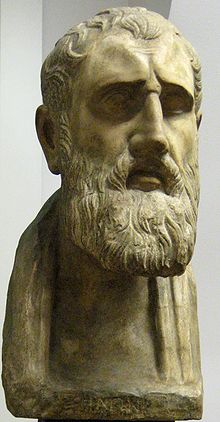Great Throughts Treasury
This site is dedicated to the memory of Dr. Alan William Smolowe who gave birth to the creation of this database.

Stoics, The Stoics or Stoicism NULL
A School of Hellenistic philosophy founded in Athens by Zeno of Citium, Stoics were concerned with the active relationship between cosmic determinism and human freedom, and the belief that it is virtuous to maintain a will (called prohairesis) that is in accord with nature.
"The soul should know whither it is going and whence it came, what is good for it and what is evil, what it seeks and what it avoids, and what is that Reason which distinguishes between the desirable and the undesirable, and thereby tames the madness of our desires and calms the violence of our fears. [Seneca]"
"The universe is change, life is opinion. [Marcus Aurelius]"
"The Stoics agree to put in the forefront the doctrine of presentation and sensation, inasmuch as the standard by which the truth of things is tested is generically a presentation, and again the theory of assent and that of apprehension and thought, which precedes all the rest, cannot be stated apart from presentation. For presentation comes first; then thought, which is capable of expressing itself, puts into the form of a propositions that which the subject receives from a presentation. [Diocles the Magnesian]"
"There are corporeal things, such as this man, this horse. Next follow movements of thought conveying an assertion respecting bodies. These movements of thought have a sort of content peculiar to themselves and incorporeal. For instance, I see Cato walking. Sense has shown this; my mind has believed it. That which I see, that to which I have directed my eyes and my mind is a body. Thereupon I say: "Cato is walking." The thought which I express in these words is not corporeal, but by it an assertion is made respecting body, and some call it a judgment, others an assertion, others a predicate. [Seneca]"
"There are two species of presentation, the one apprehending a real object, the other not. The former, which they take to be the test of reality, is defined as that which proceeds from a real object, agrees with that object itself, and has been imprinted and stamped upon the mind: the latter, or non-apprehending, that which does not proceed from any real object, or, if it does, fails to agree with the reality itself, not being clear or distinct. [Diogenes]"
"This is not the satisfaction of desire that freedom is obtained, but the destruction of desire. [Epictetus]"
"Virtue is nothing else than right reason. [Seneca]"
"There remains the fourth division of the cosmos, which is both by nature altogether fiery itself, and bestows a healthful and lifegiving heat upon all other substances. In this way the conclusion is reached that, since all the divisions of the cosmos are maintained by heat, the long-continued preservation of the cosmos itself is also due to a like and equivalent principle, all the more so as we are to understand that in the intermingling of this hot and fiery element with every organism, the power to generate, and the cause of production, are resident in that element from which all animate things, and things whose roots are contained in the earth, necessarily derive their birth and increase. [Cicero]"
"What disturbs people, these are not things, but the judgments relating to things. [Epictetus]"
"When I see a man in a state of anxiety, I say, “What can this man want? If he did not want something which is not in his power, how could he still be anxious?” [Epictetus]"
"Whatever God wills, a man also shall will; and what God does not will, a man shall not will. How, then, shall this he done? In what other way than by examining the movements of God and his administration What has He given to me as my own and in my own power? what has He reserved to Himself? He has given to me the things which are in the power of the will: He has put them in my power free from impediment and hindrance. How was He able to make the earthly body free from hindrance? And accordingly He has subjected to the revolution of the whole, possessions, household things, house, children, wife. Why, then, do I fight against God? why do I will what does not depend on the will? why do I will to have absolutely what is not granted to man? But how ought I to will to have things? In the way in which they are given and as long as they are given. But He who has given takes away. Why then do I resist? I do not say that I shall be fool if I use force to one who is stronger, but I shall first be unjust. For whence had I things when I came into the world? My father gave them to me. And who gave them to him? and who made the sun? and who made the fruits of the earth? and who the seasons? and who made the connection of men with one another and their fellowship? [Epictetus]"
"Who then is the invincible? It is he whom none of the things disturb which are independent of the will. [Epictetus]"
"Wherever I go it will be well with me, for it was well with me here, not on account of the place, but of my judgments which I shall carry away with me, for no one can deprive me of these; on the contrary, they alone are my property, and cannot be taken away, and to possess them suffices me wherever I am or whatever I do. [Epictetus]"
"Where is the good? In the will. Where is the evil? In the will. Where is neither of them? In those things which are independent of the will. [Epictetus]"